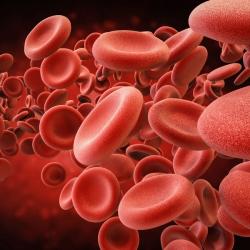
OR WAIT null SECS
Avapritinib Improves Outcomes in Indolent Systemic Mastocytosis in Real-World Data
Avapritinib 25mg daily significantly improved quality of life (QoL), disease control, and basal serum tryptase (BST) levels.
Avapritinib 25mg daily significantly improved quality of life (QoL), disease control, and basal serum tryptase (BST) levels in as early as 4 weeks after initiating treatment in patients with indolent systemic mastocytosis (MC) in a real-world setting.1
These findings, from the real-world evidence study AVATAR, were presented at the 2025 American Academy of Allergy, Asthma, and Immunology/World Allergy Organization Joint Congress, February 28-March 3, in San Diego, California, by Polina Pyatilova, MD, Institute for Allergology, Charité - Universitätsmedizin Berlin, Germany.
“Indolent systemic mastocytosis (ISM) is driven by KITD816V mutation. Avapritinib, a KIT D816V inhibitor, has been recently approved for ISM treatment. While clinical trials have shown its efficacy and safety, real-world data is lacking,” Pyatilova and colleagues wrote.1
The study included 17 patients with ISM and uncontrolled disease (mastocytosis control test [MCT] < 13) as of October 2024. The investigators assessed symptom severity, quality of life (QoL), disease control and burden before treatment at week 4, 12, and 24.1
Pyatilova and colleagues found that treatment was well-tolerated in 15 (88%) patients, data from which were reported here. The median age of the participants was 55 years, 60% were female, and all presented with skin involvement. Around half (47%) had osteoporosis, 20% had splenomegaly, and 40% reported anaphylaxis. The investigators found that avapritinib significantly improved QoL, with median MC-QoL score decreasing from 61 at baseline to 33 at week 4 (P <.001) and 17 at week 24. The median MCT score increased from 7 to 15 at w4 (P <.001) with a stable score of 16 at week 24 and thereby achieving disease control as per the protocol. Basal serum tryptase (BST) median value decreased from 53 at week 0 to 42 at week 4, and to 6 ng/mL by week 24 (P <.001). All patients reported that skin involvement continued to improve, as measured by a decrease in the number of lesions, color intensity, and absence of flushing episodes.1
“Avapritinib 25mg daily showed significant improvement in QoL, disease control, and BST reduction as early as 4 weeks after treatment in ISM patients in a real-world setting,” Pyatilova and colleagues concluded.1
Other recent research presented at the AAAAI meeting demonstrated that dupilumab (Dupixent) reduced itch and urticaria activity in patients with chronic spontaneous urticaria who were uncontrolled with H1-antihistamines, in data from 2 pooled phase 3 trials.2
The pooled analysis revealed dupilumab improved itch severity and urticaria activity compared with placebo at week 24. The Itch Severity Score demonstrated patients on dupilumab had least squares mean change from baseline of -9.9, compared with -6.7 on placebo (difference, -3,2; P < .0001). Moreover, patients on dupilumab versus placebo had least squares mean change from baseline in the Urticaria Activity Score of - 19.3 vs -13.1 (difference, - 6.2; P < .0001).2
The study showed a greater proportion of patients on dupilumab compared with placebo achieved well-controlled disease status indicated by an Itch Severity Score of ≤ 6: 43.1% vs 23.4% (P < .0001). Additionally, more patients on dupilumab (30.6%) than placebo (15.9%) reached a complete response with an Itch Severity Score of 0 at week 24 (P < .001).2
REFERENCES
1. Pyatilova P, le Coutre P, Herzog L, et al. Avapritinib improves disease control and quality of life in patients with indolent systemic mastocytosis: First results of the real-world evidence study AVATAR. Presented at: 2025 AAAAI/WAO Joint Congress, February 28-March 3. Abstract L01.
2. Press Release: Dupixent phase 3 study confirms significant improvements in itch and hives for patients with CSU. Sanofi. September 11, 2024. https://www.sanofi.com/en/media-room/press-releases/2024/2024-09-11-05-05-00-2944239. Accessed February 11, 2025.
Related Content:


